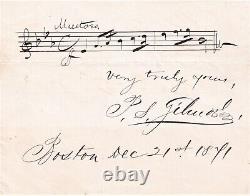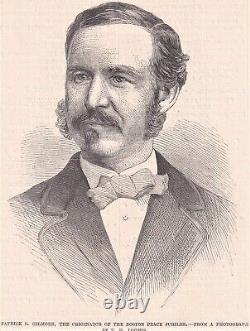PATRICK GILMORE Bandmaster & Composer AMSQU & Engraving, 1871, Boston, CIVIL WAR



Autographed 3.75" x 5" two bar musical quotation marked "maestoso" and in E flat major, Boston December 21, 1871. We offer with an original 5" x 6" stipple engraving from Frank Leslie's Magazine, National Peace Jubilee, 1869. His bands which featured 3 woodwinds for every brass instrument is still utilized by many bands today.
Irish born, Gilmore came to the United States in 1849 on a British band tour to Canada, went to Boston and stayed following his older brother who had crossed the previous year. After working in a music store, composing ballads, dances and marches, he founded a minstrel act and played and lead several local Boston area bands. He led the first "Promenade Concert" in Boston, a Pops concert, the first of it's kind in the country. In one of those bands he conducted at President James Buchanan's 1857 inauguration. A decade later in 1859 he founded The Boston Brigade Band which was later known as Gilmore's Band.Gilmore led his own works, as well as his arrangements of other composer's works, typically classical composer's works for band. A tradition which John Philip Sousa followed. Gilmore spent the Civil War as an Army bandmaster in New Orleans.
In 1861, he wrote the lyrics to "When Johnny Comes Marching Home" to a tune which had bee released several months before and published them under the pseudonym of Louis Lambert. The Civil War became a fertile territory for Gilmore, he was General Benjamin Butler's Bandmaster in New Orleans.
He organized the first combined band concert whilst in that position. After they were dismissed, he went back to Boston where he became General Nathaniel Banks "Bandmaster General". He utilized his impresario skills in 1869 where he assembled the National Peace Jubilee four years after the end of the Civil War with an orchestra of 567 musicians, a wind band of 486 musicians, a chorus of 100 ensembles and a total of 10,926 singers and the famed Norwegian violinist Olle Bull and chorusmaster Carl Zerrahn. Three years later in 1872, he created the World Peace Jubilee, bringing in Johann Strauss sohn to Boston at the highest salary ever paid to a musician to that time. The Jubilee Coliseum an amphitheater which sat 100,000 people was built, an orchestra of 2,000 musicians and a chorus of 20,000 strong.It took 100 assistant chorusmasters to lead the chorus where the event was conducted by Strauss and Gilmore. Gilmore introduced a fleet of anvil's for Verdi's "Anvil Chorus" from "Il Trovatore" and cannon fire for the military works.
Strauss composed the "Jubilee Waltz" which he dedicated to Gilmore. In 1872, the year following our autograph, Gilmore went to New York City as the Bandmaster of the 22nd Regiment Band which he took on a 150 concert tour of Europe with a great success in 1878, with several repeats, leading the way for John Philip Sousa to do the same later on. Gilmore was one of the first to see the technology of sound recording as a useful marketing tool and recorded numerous cylinders under the Gilmore's Band name. He died suddenly on tour in St. Louis 1892, the band continued in his memory for another decade.However, his death gave an immediate band leadership void which was filled by John Philip Sousa. Gilmore wrote numerous works, some in his own name and numerous under pseudonyms.
This work marked maestoso is likely a ballad. The piece in our musical quotation in E flat major is not one he typically quoted and is interesting as he was a master of the E flat major cornet, which would play from time to time whilst leading his band. Despite our best efforts looking through scores and even playing the quote on the piano for a melody database, the work remains a mystery. Perfect for display with the engraving.
Harmonie Autographs and Music, Inc.

